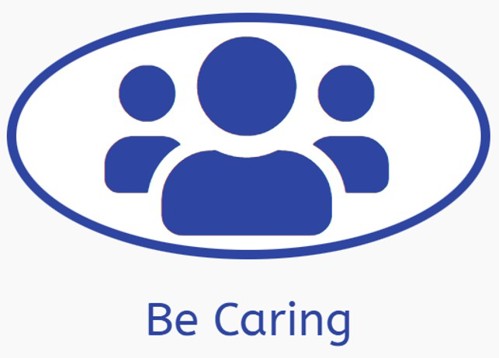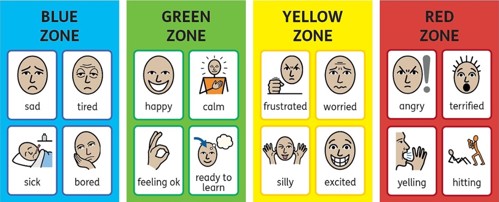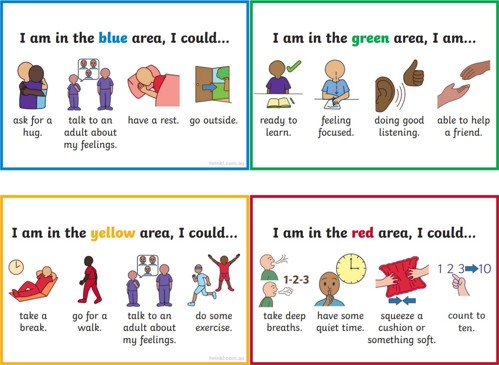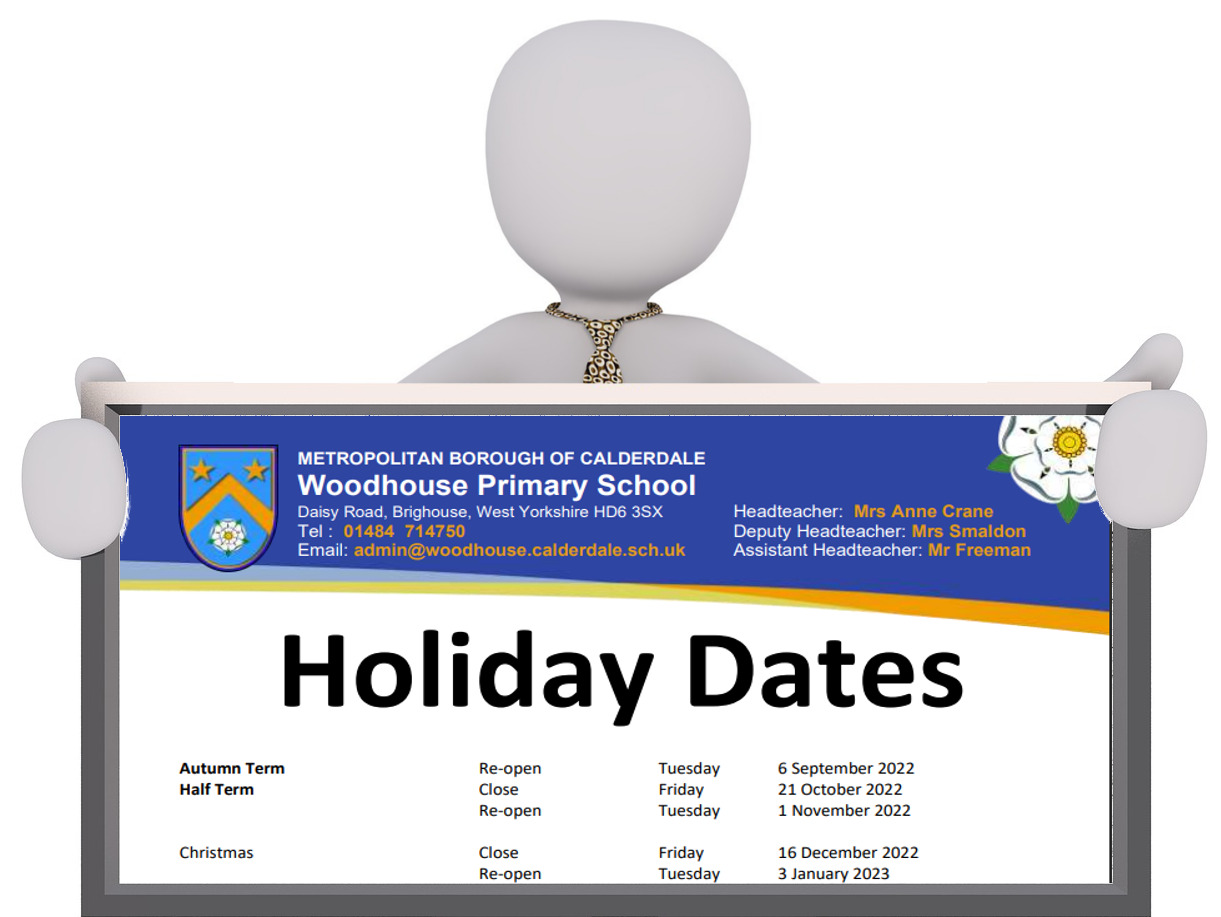In this section you will find;
Wellbeing
Wellbeing Vision Statement
Just like everyone has a body, everyone has mental health. Mental health in childhood means reaching developmental and emotional milestones learning healthy social skills and how to cope when there are problems. It is about children and young people being able to thrive, cope and manage through everyday life, particularly when problems arise. Mentally healthy children have a positive quality of life and can function well at home, in school, and in their communities. When children have good levels of wellbeing, it helps them to learn and explore the world. They can feel, express and manage both positive and negative emotions as well as being able to form and maintain good relationships.
At Woodhouse, we are committed to supporting the mental health and wellbeing of everyone in our school community. One of the ways that we do this is through our curriculum work, in RESPECT lessons and through regular assemblies which discuss how important mental health and well-being is. We have a bespoke RESPECT curriculum with a clear intent to meet the emotional wellbeing needs of pupils in school and to respond to emerging national and local issues. We strongly encourage pupils to develop resilience so they can manage normal stress and we empower pupils to self-regulate to be able to better cope with everyday challenges. All staff model and promote positive mental wellbeing by normalising talking about mental health. Within school, we promote a calm, structured and safe environment that promotes respect, values, diversity and has clear behaviour expectations. These values are underpinned by our school values (Be Bold, Be Healthy, Be Caring, Be Safe, Be Creative, Be United) which encourages pupils to develop into active, responsible citizens with good mental health and well-being. We also effectively coordinate with external agencies who are there to help with the larger challenges in life.
Wellbeing Team
Where pupils require additional support within school, we have a range of staff who can provide this.
Senior Mental Health Lead: Mrs Crane
Mental health and well-being lead: Mrs Smaldon
Well-being team: Mrs Crane, Mrs Smaldon, Miss Walker, Mr Bale, Mrs Hirst, and Mrs Thorpe
Learning mentors: Mrs Thorpe
All staff have a duty of care to monitor and support pupils with their mental health and well-being. As part of this, we have created a bespoke graduated response and flow chart of needs to highlight what is good mental health and well-being and what requires additional support. All staff can record any concerns or worries about a pupil’s mental health and well-being on the class well-being tracker. This is then monitored by the well -being team.
The well- being team meets fortnightly to discuss the well-being trackers and to allocate support to children who require additional nurture, follow up referrals to be made to outside agencies, informal check-ins with individuals and care packages for specific children as required.
Outside agencies:
At Woodhouse, we work closely with a range of outside agencies to provide the correct support that a pupil requires. We are part of the Calderdale Mental Health Support Team which is a new additional resource helping to support emotional wellbeing in school. This is through a range of strategies such as: 1:1 intervention, group work, signposting to external advice or supporting our whole school approach through training or workshops. We are extremely fortunate that within school we are also supported in our work by Anum Munir who is an Education Mental Health Practitioner (EMHP) who works as part of the Calderdale Mental Health Support Team (MHST) within Openminds CAMHS and is in school weekly. We can refer pupils to work with the EMHP when they are suffering with low mental health and well-being. School works in partnership with home and the EMHP to set up weekly support sessions or to refer to additional agencies as required. Parental drop ins are hosted termly for regular access for parents to speak to the EMHP and can include webinars which will cover useful and popular topics.
Mental Health and Well-Being support in school
Mental Health and well-being support in school
At Woodhouse, we are committed to supporting the mental health and wellbeing of everyone in our school community. In order to ensure that everyone thrives, we offer a wide range of interventions and support for all of our pupils.
Curriculum
One of the ways that we do this is through our curriculum work, in RESPECT lessons and through regular assemblies which discuss how important mental health and well-being is. We have a bespoke RESPECT curriculum with a clear intent to meet the emotional wellbeing needs of pupils in school and to respond to emerging national and local issues. We strongly encourage pupils to develop resilience so they can manage normal stress and we empower pupils to self-regulate to be able to better cope with everyday challenges.
Modelling
All staff model and promote positive mental wellbeing by normalising talking about mental health. Within school, we promote a calm, structured and safe environment that promotes respect, values, diversity and has clear behaviour expectations. These values are underpinned by our school values (Be Bold, Be Healthy, Be Caring, Be Safe, Be Creative, Be United) which encourages pupils to develop into active, responsible citizens with good mental health and well-being.
1:1 welcome in a morning
This helps support children who struggle with transition into school or may need some additional time to settle before being ready for the school day. The children have time to discus the day ahead, talk through any worries or challenges or even begin the day with a sporting activity
Play support
Some children struggle to play outside in a large group and need a space where they can socialise inside in a smaller group. Other children love to be outside but require some assistance from an adult to help them to socialise and communicate effectively. Some children are directed to attend a club at lunchtime such as reading/ colouring/ board games to help them to experience a positive lunchtime with peers.
Lunchtime club
Some children need a separate space where they can eat their lunch away from the busy hall. Smaller spaces are available for children to be able eat their lunch in a calm environment.
1:1 nurture time
At times, children may require some additional time with an adult to focus on their emotional well-being and mental health. This could be space and time to talk about their worries/ concerns and to build trusting relationships with adults in school.
Friendship support
Some children need extra help in developing and ,maintaining healthy positive friendships within their year group. Adults are aware of how best to support both on the playground through modelling and playing games as well as through the use of interventions such as Circle of Friends.
Check-ins
A check-in could be daily or at various repeated points through out a day which allows a child to build a safe and trusted relationship with a key member of staff. This allows the child to feel valued, supported and settled whilst at school.
Flow chart to support well-being
Be Carers
In KS2, each class has two ‘Be Carers’ who applied for the role using an application form. Their role is to raise awareness of mental health and well-being within school, to be able to signpost their peers on how and where to access help and support and knowing when it is important to ask for help from a trusted adult. At regular meetings, the Be Carers decide on key priorities to work on across school and aim to raise the profile of mental health and well-being within their class and across school. Each year, they access specialist training from Calderdale Mental Health Team to ensure that they have the necessary skills for this role in school.

Zones of Regulations

The Zones of Regulation is an internationally renowned intervention which helps children to manage difficult emotions, known as ‘self-regulation’. The Zones of Regulation is an approach based around the use of four colours to help children self-identify how they’re feeling and categorise it based on colour. It is designed to help children better understand their emotions, sensory needs and thinking patterns.

The children learn different strategies to cope and manage their emotions based on which colour zone they’re in. The Zones of Regulation helps children to recognise their own triggers, learn to read facial expressions, develop problem-solving skills, and become more attuned to how their actions affect other people.

Zones of Regulation Zones of Regulation Resources
How can you help your child use The Zones of Regulation at home?
✓ Model and identify your own feelings using Zones language in front of your child (e.g.: I’m frustrated. I think I am in the Yellow Zone.”)
✓ Observe your child’s behaviour and try to use strategies when they are showing signs of being in the yellow zone, to catch it before they move to the red zone.
✓ Practice calming strategies when your child is in the green zone. This may include doing some deep breathing/meditation/heavy work and sensory activities throughout their day.
✓ Talk about what tool you will use to be in the appropriate Zone (e.g.: “I need to take four deep breaths to help get me back to the Green Zone.”)
✓ Share how their behaviour is affecting your Zone. For example, if they are in the Green Zone, you could comment that their behaviour is also helping you feel happy/ go into the Green Zone.
✓ Put up and reference the Zones visuals and tools in your home to consistently refer to and check in regularly with this
✓ Praise and encourage your child when they share which Zone they are in.
✓ Develop your child’s own zones of regulation tool box
✓ Remember to monitor your language: usually less is best (minimal in the red zone)
Tips for helping your child to regulate
• Know yourself and how you react in difficult situations before dealing with your child’s behaviours.
• Know your child’s triggers.
• Be consistent in managing your child’s behaviour and use the same language you use at home.
• Empathise with your child and validate what they are feeling.
• Have clear boundaries/routines and always follow through.
• Do not deal with an angry, upset child when you are not yet calm yourself.
• Discuss strategies for the next time when you are in a similar situation.
• Remember to ask your child how their choices made you feel (empathy).
• Praise your child for using strategies. Encourage your child to take a sensory break to help regulate their bodies.
• Create a ‘calm’ box or ‘sensory box’ full of things which help to keep your child calm and alert.
Useful websites
Mind

Even though 1 in 4 people have mental health problems, most of us don’t get the help we need. This has to change. We’re Mind. We’re here to fight for mental health. For support, for respect, for you.
Place 2 Be

Guided by our mission, vison, values and approach, we have provided mental health services in schools for over 30 years.
Anxiety
|
What is the ‘norm’ of anxiety? |
When does it become a problem? |
What might help? |
|
Something all CYP experience A normal response to situations that we see as threatening Can be helpful in some situations; when we need to perform well or in an emergency Worries and fears linked to appropriate development stages- fear of dark, going to school, being separated from parents- these develop as the child learns more about the world. Worries around events or situations that are occurring- sports day, SAT’s, changing class teacher, friendship groups Feeling shy around new people Normal reaction to stress or difficult times Triggered by specific stressor Has a start and end point. Slight change to physical symptoms- butterflies in stomach, heart racing faster etc Seeking reassurance Might start reporting that they feel unwell. |
The worries take over daily life and are reoccurring. Anxiety and worries becoming persistent and no start to end so one worry might lead to further worries, seem more adult focused or never ending. Physical symptoms increase- chest pains, headaches, breathing changes; and the symptoms become more persistent and intense. Restless Losing their appetite Not sleeping well Avoiding situations, activities or events that they use to enjoy Needing lots of reassurance more than usual Overpreparing or putting things off. Having panic attacks Reports of feeling unwell a lot. Double checking a lot. |
Try speaking with your child- asking them to talk about their worries and how they are feeling. A book like a big bag of worries can help do this (add a link) Worry Time Worry Monster Worry Box
Small plans, checklists or visual aids to support situations/routines etc. Speak to school if you have tried some of the strategies but problems persist with your child, become worse, you feel you need extra support |
Low mood
|
What is the ‘norm’ of low mood? |
When does it become a problem? |
What might help? |
|
The 'normal ups and downs' of mood daily. And that being sad in relation to a particular context is 'normal' so like falling out with a friend or something happening at home. Some days cannot be bothered to do things or not want to do normal activities. Every now and then compare self to peers. Some issues sleeping Tearful after situations like being told off, feeling left out, falling out with friends, not doing what they want to do |
More persistent Taking over daily life Sad and irritable most days Not finding things fun anymore. Not engaging in hobbies, school work and wanting to be by self a lot more Change in appetite Tired or struggling with sleep Low in self-esteem or confidence Hopeless and feeling worthless Self harm |
Try talking to your child about how they are feeling Try bring in small activities a day like:
Speak to school if you have tried some of the strategies but problems persist with your child, become worse, you feel you need extra support
|
Other Services
Paws B Mindfulness
In some year groups, a separate mindfulness curriculum is explored where the learning centres on:
Our amazing brain, learning to be in the present moment, grounding ourselves when we wobble, dealing with difficulty, recognising the power of thoughts and choosing to nurture ourselves.

Rainbows
Rainbows is a project where we support groups of children who are experiencing loss. These children have experienced a wide range of losses, including death, divorce, separation, drug/alcohol abuse, prison & illness. The children are supported to express & share their feelings with other children with similar experiences, helped by trained facilitators. The areas we look at include facing fears & worries, managing anger, coping with disappointments & building self esteem. The way we achieve this is through small, gentle peer group sessions, primarily through games, crafts & discussions.

Talk Time
This programme is a peer support programme which means the pupils meet together weekly and support each other in developing a wide range of social and problem-solving skills. A variety of pupils are selected to take part in the group. As each child will bring a wide range of social and problem-solving skills to the group, this club will then promote what a good role model looks like as well as allowing each child an opportunity to develop their own social and problem solving skills whilst promoting the importance of peer support.
Outside agencies
At Woodhouse, we effectively coordinate with external agencies who are there to help with the larger challenges in life and to provide the correct support that a pupil requires.
Calderdale Mental Health Support Team
We are part of the Calderdale Mental Health Support Team which is an additional resource helping to support emotional wellbeing in school. This is through a range of strategies such as: 1:1 intervention, group work, signposting to external advice or supporting our whole school approach through training or workshops.
Education Mental Health Practitioner (EMHP)
We are extremely fortunate that within school we are also supported in our work by Anum Munir who is an Education Mental Health Practitioner (EMHP) who works as part of the Calderdale Mental Health Support Team (MHST) within Openminds CAMHS and is in school regularly. We can refer pupils to work with the EMHP when they are suffering with low mental health and well-being. School works in partnership with home and the EMHP to set up weekly support sessions or to refer to additional agencies as required. Parental drop ins are hosted termly for regular access for parents to speak to the EMHP and can include webinars which will cover useful and popular topics.
To make a referral to the EMHP, please complete the following referral form and return to school. (add link to EMHP brief suitability discussion from)
Noah’s Ark
We can refer children in Y5-6 who need counselling for a wide variety of reasons. This Early Intervention Service to support children who are beginning to show the effects of having suffered "adverse childhood experiences" in that they may be showing signs of struggling with their emotional and behavioural regulation, their relationships with their peers and/or school staff. Examples could include abuse; neglect; parental separation; death of a family / household member; household mental illness; household domestic violence; household alcohol l/ drug abuse; and incarceration of a family / household member. Counselling offers a safe and confidential space for these children to talk freely and openly to someone who is not a family member or a friend.
Assemblies and National events
It is important to celebrate and raise awareness of mental health and well-being by taking part in whole school assemblies and joining together as a school to recognise national events which promote open talking around mental health and well-being. Each year we celebrate Children’s Mental Health week in our RESPECT lessons and through assemblies. We welcome visitors such as Invictus Wellbeing who add external voices to the importance of talking about our mental health.
Family Support
Being a parent can sometimes feel like a very difficult job and we acknowledge that we all need a little support from time to time. Sometimes it can be hard to ask for help which is why there is a dedicated team in Calderdale that school can refer you into that can work with families to develop a plan of support. Family Support offer practical, friendly advice to help you deal with any aspect of family life and parenting support is something available to all parents.
Early Help Pathway
The Early Help Pathway aims to give children and families having trouble at any point in their lives help, as early as possible. Effective early help works to:
§ Stop problems before they happen.
§ Stop current problems getting worse.
§ Nurture personal strengths and skills that prepare children to live a larger life.
§ Build resilience in families to access support when they need it.
Supporting children and families is all about helping them to be more resilient and able to access targeted support when they need it. The Pathway aims to bring Partners together as early as possible to combine resources to help achieve change.
School Nursing Team
In Calderdale, the school nursing team act as a single point of contact for all non-urgent physical health and emotional wellbeing concerns about school-aged children and young people. The school nursing team are uniquely placed to be able to assess a child’s health needs by carrying out a holistic health needs assessment, and not simply responding to the presenting problem. A holistic health needs assessment ensures that a full picture of the child’s needs – emotional as well as physical – can be explored.
Time Out
Time Out runs workshops in school on topics relating to emotional wellbeing, such as stress, self-harm and self-esteem.
CAMHS
CAMHS in Calderdale provide an evidence-based, comprehensive service to children and young people aged up to 18 years who are experiencing emotional and mental health problems.
Tips for parents
Moments of connection (and re-connection) are really important in child-caregiver relationships. Follow these top tips to encourage you to connect with your child in everyday ways.
1. When you pick your child up from school, or come in from work, try to give them your full attention and see if this helps you feel better connected as you hug, talk, smile and hear about their day. Watching your child play and joining in is really important to them – so put your phone away and have a bit of fun – being playful is good for adults, too! With your older child, you may find times such as car journeys a good time to talk, or to reconnect by playing music you both like. It is important to be accessible to a teenager when they need to talk. You may have to be there ‘on their terms’ and be ready to listen.
2. Talk to your child about important connections. This could include talking about family members, friends, neighbours, childminders, people in the local community and others in your faith group (if you have one). Remember it’s ok to talk about people they miss, for example, family members who live in a different country or people who have died. Children learn a lot from their parents about how to express their feelings, including the joy that comes with feeling connected to others and the sadness that comes with missing others.
3. Talk to your child about their friends. As children become teenagers, their friendship groups become increasingly important to them. Be open to hearing about their friendships and try to listen without judgement. Ask them about their life in real life and online. You may not think online friends are ‘real friends’, but your child may feel differently. Losing friends, feeling left out or being bullied is very painful and your child needs to know you will support them through these difficult times.
4. Connect by taking an interest in your child’s world. As adults we can sometimes be dismissive of the things that our children and teenagers are interested in, e.g. their music, fashion, what they watch etc. If you do take an interest in these things, however, you may feel better connected to your child and the important things in their world. This can lead to other conversations about other things in their lives that matter to them.
5. Find time to connect as a family. Family life can become busy and stressful, so it’s important to find some time where you connect together. This could include simple things like cooking, watching a film, playing a game, going to the park or even doing the family shop together.
6. Try to resolve conflict and re-connect after arguments. Arguments and moments of disconnection are bound to happen in families - between your children, between yourself and your children and between yourself and your partner, if you have one. It is important that children learn how to disagree in appropriate ways, how to say sorry and how to make amends when they have done something wrong. They will learn a lot about how to do these things from you - so try to model the behaviour you want to see in your children. Talk to them about how to re-connect with friends after arguments including what they can do to help repair relationships.

